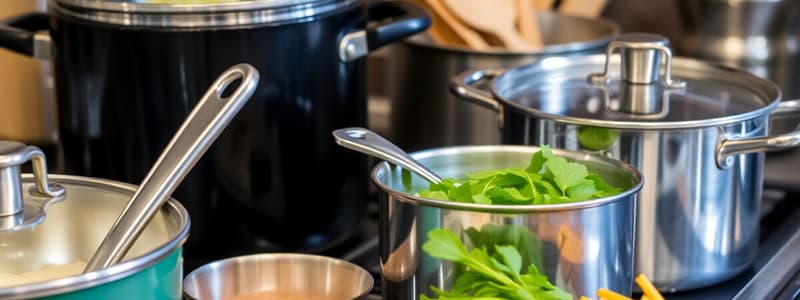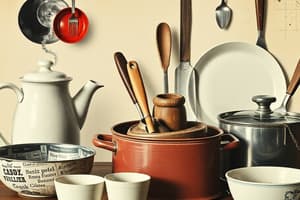Podcast
Questions and Answers
Which of the following materials is favored for its affordability and widespread use in kitchens?
Which of the following materials is favored for its affordability and widespread use in kitchens?
- Stainless steel
- Glass
- Aluminum (correct)
- Cast iron
What is the primary maintenance requirement for cast iron cookware to prevent corrosion?
What is the primary maintenance requirement for cast iron cookware to prevent corrosion?
- Keeping it oiled (correct)
- Storing it in a dry environment
- Applying a non-stick coating
- Regular washing with detergent
For which of the following cooking tasks is a double boiler most suited?
For which of the following cooking tasks is a double boiler most suited?
- Baking desserts
- Stir-frying vegetables
- Maintaining a consistent temperature (correct)
- High-heat searing
Why should cookware be allowed to cool before washing?
Why should cookware be allowed to cool before washing?
Which cleaning tool would be most appropriate for removing stubborn food residue from cookware?
Which cleaning tool would be most appropriate for removing stubborn food residue from cookware?
What is the last action recommended to preserve the appearance of your cooking ware?
What is the last action recommended to preserve the appearance of your cooking ware?
Which of the following kitchen tools is specifically designed for straining vegetables and pasta?
Which of the following kitchen tools is specifically designed for straining vegetables and pasta?
A cook needs to accurately measure a small amount of vanilla extract for a cake recipe. Which tool is most appropriate?
A cook needs to accurately measure a small amount of vanilla extract for a cake recipe. Which tool is most appropriate?
Which of these knives is best suited for dicing onions?
Which of these knives is best suited for dicing onions?
When cleaning kitchen tools and equipment, what should be done after washing to prevent cockroach attraction and odor development?
When cleaning kitchen tools and equipment, what should be done after washing to prevent cockroach attraction and odor development?
Which type of cleaning agent is specifically designed to remove mineral deposits?
Which type of cleaning agent is specifically designed to remove mineral deposits?
What should be the first step when washing dishes by hand to ensure effective cleaning and hygiene?
What should be the first step when washing dishes by hand to ensure effective cleaning and hygiene?
Why is it important to avoid soaking aluminum cookware while washing dishes?
Why is it important to avoid soaking aluminum cookware while washing dishes?
What is the purpose of a scraper in food preparation?
What is the purpose of a scraper in food preparation?
In what order should dishes be washed by hand, according to the provided information?
In what order should dishes be washed by hand, according to the provided information?
Why is it not advisable to use laundry detergents for washing dishes?
Why is it not advisable to use laundry detergents for washing dishes?
A food preparation task requires the use of kitchen shears. What is the most likely application for this tool?
A food preparation task requires the use of kitchen shears. What is the most likely application for this tool?
Which kitchen tool is designed for pulping garlic?
Which kitchen tool is designed for pulping garlic?
What is the primary function of temperature scales in cooking?
What is the primary function of temperature scales in cooking?
Why should you wear rubber gloves when washing dishes?
Why should you wear rubber gloves when washing dishes?
Flashcards
Aluminum Cookware
Aluminum Cookware
A popular and inexpensive cooking material commonly used in kitchens.
Stainless Steel Cookware
Stainless Steel Cookware
A popular and more expensive cooking material known for its durability.
Cast Iron Cookware
Cast Iron Cookware
Cookware that must be oiled to prevent rusting and should be washed with soap (not detergent).
Glass Cookware
Glass Cookware
Signup and view all the flashcards
Double Boiler
Double Boiler
Signup and view all the flashcards
Teflon Cookware
Teflon Cookware
Signup and view all the flashcards
Colander
Colander
Signup and view all the flashcards
Plastic and Hard Rubber Tools
Plastic and Hard Rubber Tools
Signup and view all the flashcards
Funnels
Funnels
Signup and view all the flashcards
Cutting Board
Cutting Board
Signup and view all the flashcards
Graters
Graters
Signup and view all the flashcards
Garlic Press
Garlic Press
Signup and view all the flashcards
Kitchen Shears
Kitchen Shears
Signup and view all the flashcards
Potato Masher
Potato Masher
Signup and view all the flashcards
Rotary Egg Beater
Rotary Egg Beater
Signup and view all the flashcards
Scraper
Scraper
Signup and view all the flashcards
Serving Spoons
Serving Spoons
Signup and view all the flashcards
Serving Tongs
Serving Tongs
Signup and view all the flashcards
Spatula
Spatula
Signup and view all the flashcards
Spoons
Spoons
Signup and view all the flashcards
Study Notes
Cooking Materials
- Aluminum is a popular and inexpensive material used in the kitchen.
- Stainless steel is a popular and more expensive material.
- Cast iron must be oiled to prevent rusting and should be washed with soap, not detergent.
- Glass is used for making salads and desserts.
- Double boilers are used when a consistent temperature needs to be maintained.
- Teflon is used to create non-stick pans or pots.
Care of Cooking Ware
- Before washing, allow cookware to cool to prevent burns and/or damage.
- Cookware needs to be free of food and grease, so use warm, soapy water and scrub them with a steel wool cleaner, then rinse thoroughly with warm water.
- Use a cloth to dry cookware after washing to preserve its appearance.
Kitchen Tools
- A can opener opens food containers.
- Colanders, or strainers, are used to clean vegetables and strain pasta.
- Plastic and hard rubber are used for cutting and chopping.
- Funnels are used for filling jars.
- Cutting boards made of wood or plastic are for cutting meat or vegetables.
- Graters are used to grate, shred, and slice.
- Garlic presses pulp garlic.
- Kitchen shears open food packages or remove tags.
- Potato mashers mash cooked potatoes, carrots, and other soft foods.
- Rotary egg beaters beat small amounts of eggs or batter.
- Scrapers are rubber or silicone tools that blend or scrape food from bowls.
- Serving spoons are small, shallow bowls on handles for food preparation or serving.
- Serving tongs grab and transfer food items to platters, hot deep fryers, and plates.
- Spatulas level off ingredients when measuring and spread frostings and sandwich fillings.
- Spoons can be solid, slotted, or perforated and are made of stainless steel or plastic.
- Temperature scales measure heat intensity.
- Whisks mix, whip eggs or batter, and blend gravies, sauces, and soups.
- Wooden spoons are made of hardwood and are used to cream, stir and mix.
Measuring Tools
- Measuring cups for liquid ingredients are used to measure liquid ingredients.
- Household scales weigh large quantities of ingredients.
- Dippers scoop soft food like fillings and ice cream.
- Measuring spoons measure small quantities of ingredients.
Kinds of Knives
- French knives, or chef's knives, chop, dice, or mince food.
- Fruit and salad knives prepare vegetables and fruits.
- Citrus knives have two-sided blades and serrated edges to section citrus.
- Kitchen knives are cook or chef tools for all types of kitchen tasks.
- Paring knives core, peel, and section fruits and vegetables.
- Vegetable peelers scrape vegetables.
Equipment
- Refrigerators and freezers prevent bacterial infections from foods.
- Ovens are chambers or compartments for cooking, baking, heating, or drying.
- Microwave ovens cook or heat food.
- Blenders chop, blend, mix, whip, puree, grate, and liquefy foods.
Care of Kitchen Tools and Equipment
- Regularly clean and sanitize stoves, sinks, and cabinets.
- Keep garbage cans covered, clean them often, and empty them regularly.
- Regularly clean and sanitize tools and equipment, like knives, kettles, and pots, after using.
- Disinfect and remove stains or grease by using vinegar with water.
- Air dry tools before storing to prevent attracting cockroaches or wet shelves that cause odors.
Chemicals Used in Cleaning and Sanitizing
- Use the best cleaning agent for the job being done, as not all cleaning agents can be used on food-contact surfaces.
- Cleaning compounds are required to make cleaning easy.
- Detergents are cleaning agents or solvents to wash tableware and equipment, for example, soap, soap powders, cleaners, and acids.
- Solvent cleaners are degreasers for surfaces where grease has burned onto, like parts of ovens and grills needing frequent degreasing.
- Acid cleaners removes mineral deposits that detergents can not eliminate, such as scale in washing machines and steam tables, limescale on dishwashers, and rust on shelving (ex: phosphoric acid, nitric acid).
- Abrasives remove heavy soil accumulations difficult to remove, but must be used carefully to avoid damage.
Steps for Washing Dishes
- Wear rubber gloves to protect hands and aprons.
- Scrape food pieces from dishes into a garbage can.
- Stack dishes in order: glassware, silverware, chinaware, and utensils from right to left.
- Fill the sink with water and detergent and use tolerable heat for sanitizing and cutting grease.
- Wash the lightest soiled dishes first: glasses, cups, and flatware.
- Wash each plate, bowl, and serving dish after scraping and rinsing it in hot water.
- Soak pots and pans, add extra soap and water to burnt pots, and let them stand while washing other dishes.
- Lay dishes out on a rack to air-dry or dry them with a towel.
- Ensure there is no visible matter or "greasy" feel; consider rewashing if there is grease.
- Rinse out brushes and sponges and allow them to dry; sterilize equipment with boiling water and bleach.
Tips and Warnings for Washing Dishes
- Wash glassware before greasy pots and pans.
- Use rubber gloves to protect hands and allow for hotter water during washing or rinsing.
- Hand dry dishes with a clean cloth.
- Add a tablespoon of baking soda to soapy water to soften dirt while cutting grease.
- Never dump sharp knives into soapy dishwater, where they cannot be seen.
- Do not use laundry or dishWATER detergents to wash dishes.
- Keep dishwashing liquid out of children's reach.
- Wash dishes easily by scrubbing them under the water and bringing them out to check for missed spots.
- Stack a few dishes in the sink at a time and allow them to soak while washing another dish.
- Use a paper towel to dry pots and pans to reduce residue on the dishcloth.
- Do not soak aluminum when dishwashing because it may cause darkening, and use a lint-free cloth for drying silverware.
Studying That Suits You
Use AI to generate personalized quizzes and flashcards to suit your learning preferences.




